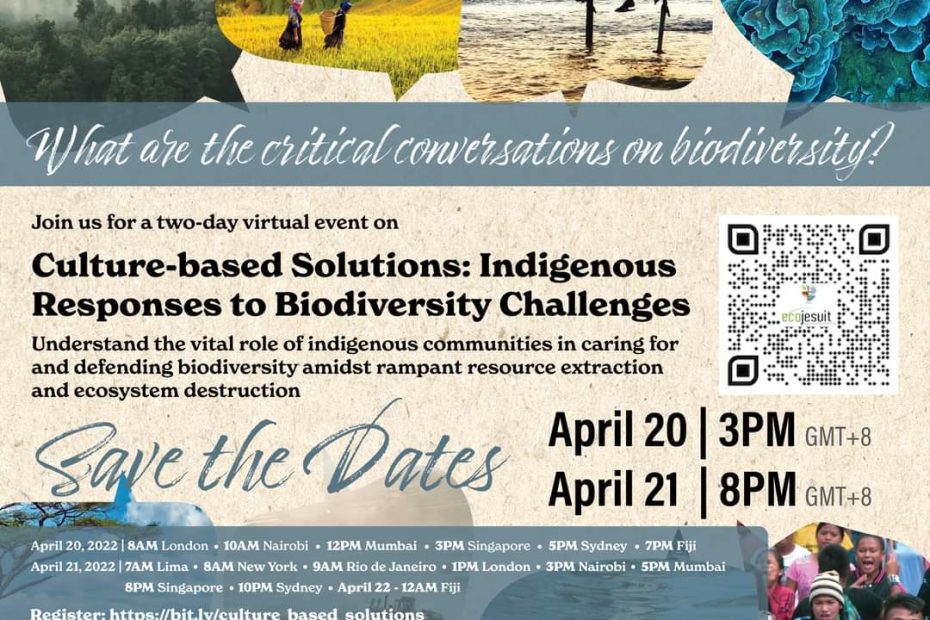River above Asia Oceania Ecclesial Network (RAOEN), with Ecojesuit, organized Culture-based solutions: Indigenous responses to biodiversity challenges, a two-day virtual event on 20 and 21 April 2022 to share and amplify local and indigenous experiences in caring for biodiversity as the local to global process towards COP27, the UN climate conference in November 2022.
The event provides a platform to share local and indigenous concerns ahead of the start of Part 2 of the 15th meeting of the Conference of the Parties to the Convention on Biological Diversity (COP15) in Kunming, China and the 21st Session of the UN Permanent Forum on Indigenous Issues (UNPFII) in New York, USA. Day 1 (20 April) focused on the Asia and Oceania regions and Day 2 (21 April) focused on the Latin America and the Caribbean, South Asia, and Africa and the Madagascar regions.
It is critical that the concerns of indigenous communities and their vital role in caring for biodiversity are heard in global discussions, and COP15 in China and the 21st Session of the UNPFII in New York City are opportunities to bring these concerns forward from a faith-based standpoint.
One of the key messages of the Intergovernmental Science-Policy Platform on Biodiversity and Ecosystem Services (IPBES) in its global assessment report on biodiversity and ecosystem services in May 2019 is the vital role of indigenous communities in protecting biodiversity. Biodiversity loss in the past 50 years is unprecedented with resource extraction becoming more rampant.
For indigenous communities, the IPBES report states: “D5. Recognizing the knowledge, innovations, practices, institutions and values of indigenous peoples and local communities, and ensuring their inclusion and participation in environmental governance, often enhances their quality of life and the conservation, restoration and sustainable use of nature, which is relevant to broader society. Governance, including customary institutions and management systems and co-management regimes that involve indigenous peoples and local communities, can be an effective way to safeguard nature and its contributions to people by incorporating locally attuned management systems and indigenous and local knowledge. The positive contributions of indigenous peoples and local communities to sustainability can be facilitated through national recognition of land tenure, access and resource rights in accordance with national legislation, the application of free, prior and informed consent, and improved collaboration, fair and equitable sharing of benefits arising from the use, and co-management arrangements with local communities.”
The impacts of climate change further exacerbate these challenges. In the global climate talks, nature-based solutions (NbS) is often the phrase used as a means to alleviate the global crises. However, NbS are not necessarily culture based as these can be understood as mainly technological approaches. Culture-based solutions are the true nature-based solutions, primarily rooted in indigenous practices that naturally care for the land, forests, water, and biodiversity being in sync with ecological services.
Those who joined the RAOEN and Ecojesuit event included: Jason Menaling (Apu Palamguwan Cultural Education Center in Bendum, Upper Pulangi, Bukidnon, Philippines ), Petero Qaloibau (Sisi Initiative Site Support Group in the Island of Vanua Levu, north of Fiji), Samantha Kuman (Centre for Environmental Law and Community Rights in Papua New Guinea), Carlos Bresciani SJ (Solidarity and Indigenous Apostolate Network in Mapuche Territory, Chile), Dr. Ashok Alur (Centre for Excellence for Farmer Producer Organizations in India), and Micomyiza Dieudonn’e (Jesuit Centre for Theological Reflections in Lusaka, Zambia) to share grounded experiences in relation to local concerns and biodiversity challenges.


